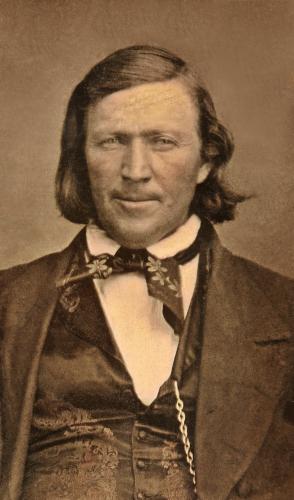4.1 Brigham Young articulates authority over legislature, February 4, 1852
Brigham Young defends his right to “dictate” to the legislature and he encourages them to cooperate in order to get bills passed, February 4, 1852
Document Introduction
Brigham Young’s speech on February 4 is important because it offers a sense of his defiant attitude regarding the overlap between his role as a religious leader and his role as governor of Utah Territory.[1] He saw no meaningful distinction between the two positions, especially given the fact that the legislators were all Latter-day Saints and that in Young’s mind temporal and political matters where ultimately spiritual matters too. The other reason Young’s February 4 speech is significant is because it offers enticing clues about an ongoing debate with Orson Pratt. Young makes it clear that Pratt also spoke on February 4, but George Watt did not record his speech or if he did, it was not preserved in Watt’s papers. It is important context to know that an apostle/legislator disagreed with the Latter-day Saint prophet/governor and that Young’s ideas regarding race and voting rights did not emerge from a vacuum, but clearly came out of specific and earthly circumstances. Young’s February 4 speech is therefore an important contextual element which helps to better understand his racial views which he expressed forcefully the following day.
[1] Brigham Young, February 4, 1852, CR 100 912, Church History Department Pitman Shorthand transcriptions, 2013-2021, Addresses and sermons, 1851-1874, Miscellaneous transcriptions, 1869, 1872, 1889, 1848, 1851-1854, 1859-1863, Utah Territorial Legislature, 1852 January-February, Church History Library, Church of Jesus Christ of Latter-day Saints, Salt Lake City, Utah.


